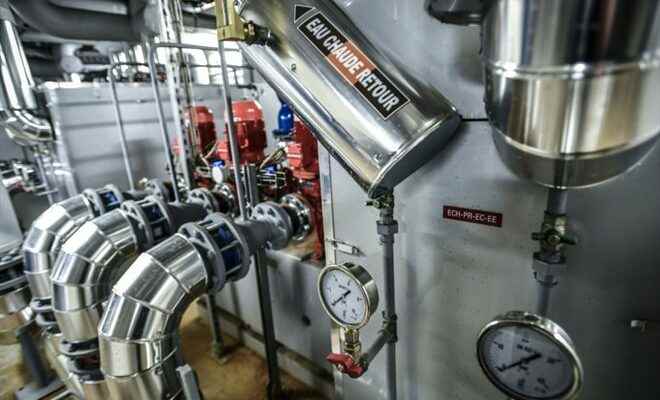In the GRTgaz compressor station in Morelmaison, in the Vosges, on November 28, 2022 (AFP/Archives/SEBASTIEN BOZON)
The consumption of gas or electricity fell significantly in France at the end of 2022, contributing, with rather mild weather, to removing, at least in the short term, the specter of power cuts suffered.
A sobriety, responding to the call launched by Prime Minister Elisabeth Borne at the end of August, the extent and the springs of which differ, depending on whether one is an individual, a business manager, or a trader. Overview:
The reductions concern -almost- everyone
“The fall in consumption concerns all sectors: industrial, tertiary and residential”, indicates the manager of high and very high voltage power lines RTE, in its latest barometer published on December 27.
Same observation at GRTgaz, which paints a picture of lower consumption since August 1 compared to the same period of 2018 (-10.8%) in climate-corrected data, both among industrialists (-22.1% ) than for the public distribution networks (-14%), which supply private individuals in particular.
A major exception, the power plants that use gas to produce electricity and compensate for the shutdown of the many nuclear reactors undergoing maintenance or repair, have increased their gas consumption by 42%.
Individuals, a voluntary sobriety difficult to measure
“Citizen gesture” hailed by the president of the Energy Regulation Commission (CRE) Emmanuelle Wargon: Over the four weeks ended December 25, aggregate electricity consumption in the residential and tertiary sectors was “lower by approximately 6.5% compared to the level of 2021”, according to RTE.

(AFP/STEPHANE DE SAKUTIN)
These figures “confirm the trend observed for several weeks, and the real effect of the sobriety actions taken by individuals and companies”, according to the manager.
For Ms. Wargon, households “anticipate the increase in regulated prices, which will be 15% in January for gas and 15% in February for electricity”.
The “shield” limiting the increase in electricity prices in France to 4% in 2022 has “made that in Europe, we are the country where citizens have suffered the smallest increases”, underlines Rémy Rousset, founding president of Lite, an online service that helps individuals reduce their energy consumption.
“We still have a phenomenon of anticipation on the increase in prices which pushes people to pay more attention to their consumption”, he adds.
Statement tempered by François Carlier, general delegate of the consumer association CLCV, for whom “the messages of communication, pedagogy, and explanations made it possible to make the effort”.
According to him, “the relationship between price and consumption on essential needs are relative. It is not because a price rises by 15% that we completely change its uses, and in addition, a drop in consumption in anticipation of an increase, it’s more speculative than anything else. We’ll see in January”.
In mass distribution, which weighs half of the consumption of the tertiary sector, the drop amounted to 6.3% in November compared to November 2021, according to the technical federation of the Perifem sector.
The industry, a traditional decline, amplified by soaring prices

The new facilities of the Coeur Défense tower, in the La Défense business district near Paris, which reduce energy consumption, on December 20, 2022 (AFP/Archives/STEPHANE DE SAKUTIN)
“There is a combination of several phenomena” to explain the drop in industrial energy consumption, both for gas (-22.1% between August 1 and December 25 compared to 2018) and for electricity ( -15.8% in the month before Christmas compared to 2021), explains Nicolas de Warren, president of Uniden.
This association represents 36 energy-intensive industrialists, weighing more than 70% of the industrial energy consumed in France, in the food industry, automotive, chemicals, cement, electronics, metals, paper, transport or the glass.
If energy-intensive industries slow down the pace of factories at the end of the year to reduce their inventories and not deteriorate their balance sheet, “this phenomenon is singularly amplified today, partly due to the deterioration of the order book for the first half,” says de Warren.
Another more specific element, linked to the energy price crisis, “quite a few companies have been proceeding for several months with marginalist approaches, which consist in becoming much more selective on their order book and eliminating sales which are at a loss or the least valued,” adds Mr. de Warren.
However, this type of arbitration is “not sustainable in the long term”, he specifies.
© 2022 AFP
Did you like this article ? Share it with your friends with the buttons below.




